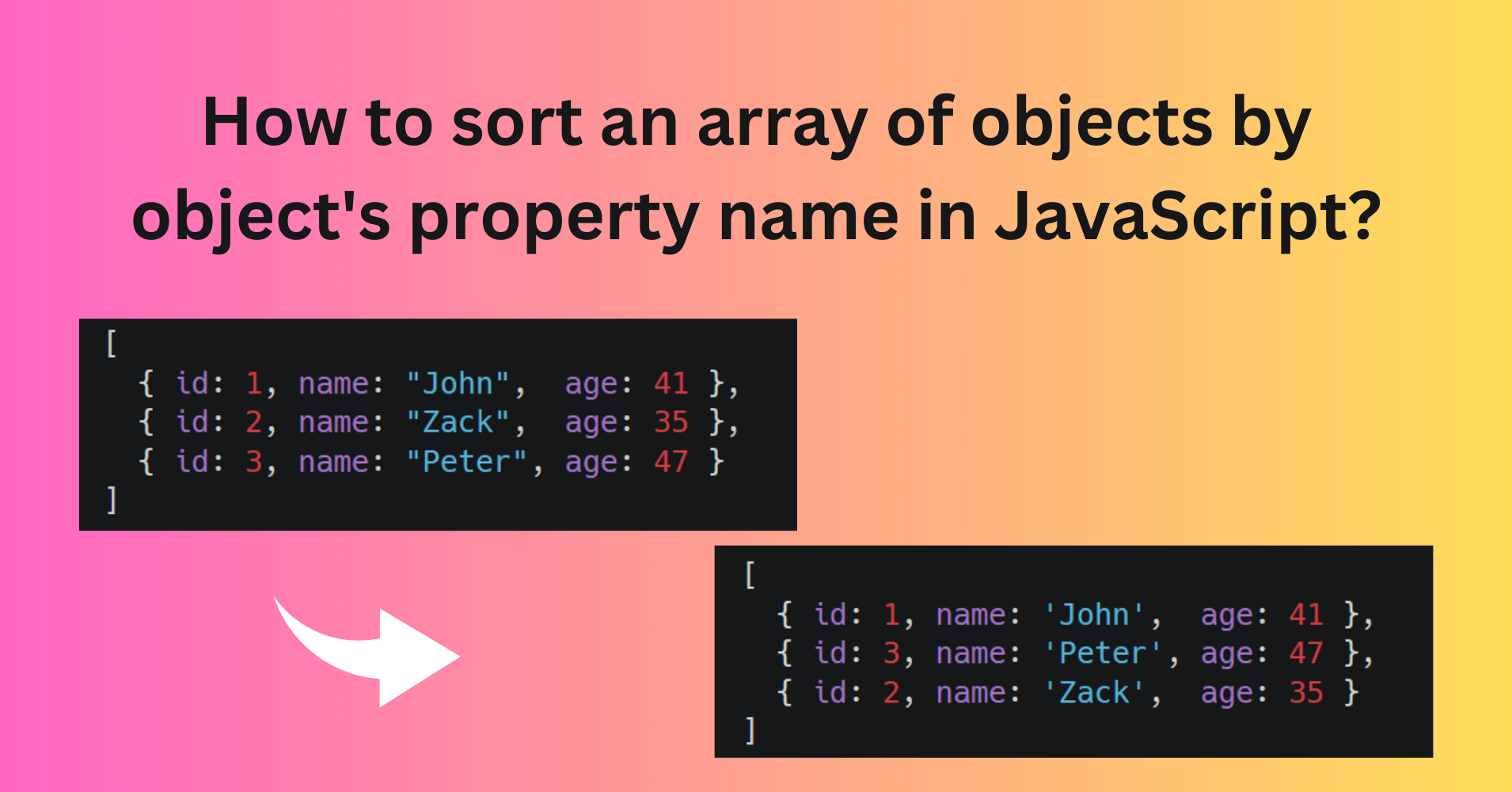PHP Sort Array of Objects by Property
Learn how to efficiently sort an array of objects in PHP based on a specific object property using usort, a powerful built-in function.
Learn how to efficiently sort an array of objects in PHP based on a specific object property using usort, a powerful built-in function.
In PHP, sorting an array of objects based on a specific property can be achieved using the usort() function in conjunction with a custom comparison function. This approach provides flexibility in defining the sorting criteria based on object properties.
To sort an array of objects in PHP by a specific property, you can use the usort() function with a custom comparison function.
Let's say you have an array of objects like this:
$objects = [
(object)['name' => 'Banana', 'price' => 1.50],
(object)['name' => 'Apple', 'price' => 1.00],
(object)['name' => 'Orange', 'price' => 1.25],
];You can define a comparison function that compares the 'name' property of two objects:
function compareByName($a, $b) {
return strcmp($a->name, $b->name);
}Then, use usort() to sort the array using your custom function:
usort($objects, 'compareByName');Now, the $objects array will be sorted alphabetically by the 'name' property.
The PHP code defines an array of objects, each representing a fruit with a name and price. It then defines a custom comparison function to sort the objects alphabetically by their names. The code uses the usort() function with the custom comparison function to sort the array in place. Finally, it prints the sorted array, resulting in the objects being ordered alphabetically by their names: Apple, Banana, and Orange.
<?php
// Define an array of objects
$objects = [
(object)['name' => 'Banana', 'price' => 1.50],
(object)['name' => 'Apple', 'price' => 1.00],
(object)['name' => 'Orange', 'price' => 1.25],
];
// Define a comparison function to sort by 'name'
function compareByName($a, $b) {
return strcmp($a->name, $b->name);
}
// Sort the array using the custom comparison function
usort($objects, 'compareByName');
// Print the sorted array
print_r($objects);
?>Output:
Array
(
[0] => stdClass Object
(
[name] => Apple
[price] => 1
)
[1] => stdClass Object
(
[name] => Banana
[price] => 1.5
)
[2] => stdClass Object
(
[name] => Orange
[price] => 1.25
)
)
Explanation:
$objects array contains three objects, each with name and price properties.compareByName() function takes two objects as arguments ($a and $b) and uses strcmp() to compare their name properties. It returns:
$a->name comes before $b->name alphabetically.$a->name comes after $b->name.usort() to sort: The usort() function takes the array ($objects) and the name of the comparison function ('compareByName') as arguments. It sorts the array in place using the provided function.print_r() function displays the sorted array, showing that the objects are now ordered alphabetically by their name property.Flexibility of usort(): The usort() function provides a highly flexible way to sort arrays of objects. You can define comparison functions for any property or combination of properties, allowing for complex sorting logic.
Understanding strcmp(): The strcmp() function is used within the comparison function to compare strings alphabetically. It returns:
Sorting in Reverse Order: To sort in descending order, simply reverse the comparison logic within the compareByName() function. For example:
function compareByNameDesc($a, $b) {
return strcmp($b->name, $a->name); // Note: $b is compared to $a
}Sorting by Multiple Properties: You can extend the comparison function to sort by multiple properties. For instance, to sort by 'name' and then 'price':
function compareByNameAndPrice($a, $b) {
if ($a->name == $b->name) {
return $a->price - $b->price; // Sort by price if names are equal
}
return strcmp($a->name, $b->name);
}Alternatives to usort():
array_multisort(): Can be used for sorting by multiple properties, but it can be less intuitive for object arrays.Object-Oriented Approach: In an object-oriented context, you could define a method within your object class to handle the comparison logic, making the code more reusable and encapsulated.
| Feature | Description |
|---|---|
| Goal | Sort an array of objects in PHP by a specific property. |
| Function | usort(array &$array, callable $callback): bool |
| Steps | 1. Define a comparison function: This function takes two objects as arguments and returns an integer less than, equal to, or greater than zero if the first argument is considered to be respectively less than, equal to, or greater than the second. 2. Use usort(): Pass the array of objects and the name of your comparison function to usort(). |
| Example | Sorting an array of objects by the 'name' property alphabetically. |
| Code Example | php<br>$objects = [ (object)['name' => 'Banana', 'price' => 1.50], (object)['name' => 'Apple', 'price' => 1.00], (object)['name' => 'Orange', 'price' => 1.25], ];<br>function compareByName($a, $b) { return strcmp($a->name, $b->name); }<br>usort($objects, 'compareByName');<br> |
This article explored how to sort an array of objects in PHP using a custom comparison function with usort(). We demonstrated sorting by a single property and discussed advanced scenarios like sorting by multiple properties or in reverse order. The flexibility of usort() makes it a powerful tool for managing object arrays in PHP, allowing for complex sorting logic based on your application's needs. Understanding how to leverage custom comparison functions with usort() provides developers with greater control over data manipulation and presentation in PHP.
 Sort array of objects by object fields in PHP - GeeksforGeeks | A Computer Science portal for geeks. It contains well written, well thought and well explained computer science and programming articles, quizzes and practice/competitive programming/company interview Questions.
Sort array of objects by object fields in PHP - GeeksforGeeks | A Computer Science portal for geeks. It contains well written, well thought and well explained computer science and programming articles, quizzes and practice/competitive programming/company interview Questions. Sort Array of Objects by Object Fields in PHP | Sort array of objects by object fields in PHP - There are several ways to sort an array of objects by object fields in PHP. Here are some common approaches: Using usort() function with a custom comparison function Implementing a custom sorting algorithm Utilizing the array_multisort() function Using usort() Function with a Custom C
Sort Array of Objects by Object Fields in PHP | Sort array of objects by object fields in PHP - There are several ways to sort an array of objects by object fields in PHP. Here are some common approaches: Using usort() function with a custom comparison function Implementing a custom sorting algorithm Utilizing the array_multisort() function Using usort() Function with a Custom C How to sort an array of objects by multiple properties in JavaScript ... | The sort method in javascript can be difficult to intuit. Let's consider an advanced use case.
How to sort an array of objects by multiple properties in JavaScript ... | The sort method in javascript can be difficult to intuit. Let's consider an advanced use case. array_column - Manual - PHP | PHP is a popular general-purpose scripting language that powers everything from your blog to the most popular websites in the world.
array_column - Manual - PHP | PHP is a popular general-purpose scripting language that powers everything from your blog to the most popular websites in the world. How to Sort an Array of Objects by Property Name in JavaScript | In this tutorial, you'll learn about one of the most common operations you'll perform while working with JavaScript: sorting an array of objects by property name. Basic Array Concepts Let's review some basic JavaScript concepts before delving deeper ...
How to Sort an Array of Objects by Property Name in JavaScript | In this tutorial, you'll learn about one of the most common operations you'll perform while working with JavaScript: sorting an array of objects by property name. Basic Array Concepts Let's review some basic JavaScript concepts before delving deeper ... Sort an Array of Objects in JavaScript with the sort() method ... | Sort an array of objects in JavaScript dynamically. Learn how to use Array.prototype.sort() and a custom compare function, and avoid the need for a library.
Sort an Array of Objects in JavaScript with the sort() method ... | Sort an array of objects in JavaScript dynamically. Learn how to use Array.prototype.sort() and a custom compare function, and avoid the need for a library.